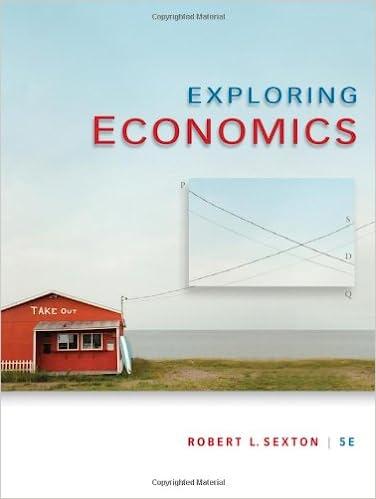Question
Long Run Costs Reading Assignment: 1.Textbook, Microeconomics , Chapter 7 2.Textbook, Microeconomics , Chapter 1 on the Smith and the Division of Labor 1.What happens
Long Run Costs
Reading Assignment:
1.Textbook,Microeconomics, Chapter 7
2.Textbook,Microeconomics, Chapter 1 on the Smith and the Division of Labor
1.What happens to the firm's LAC if there are economies of scale?Diseconomies of scale? Constant Returns to Scale?
2.What is MOS? The size of MOS is dependent on the existence of ___________
3.Why will sub-MOS firms incur cost penalties?
4.How can contract producers help Sub-MOS firms survive?
5.Identify the economy of scale in beer packaging (i.e., bottling and canning).
6.Sam Adams Brewery uses two strategies to cope with its sub-MOS size. Identify both strategies.
- _______________________________________________
- _______________________________________________
7.How does Rolls-Royce's production volume compare to that of General Motors? __________. Does this make Rolls-Royce a sub-MOS firm? ______________
8.Why have Rolls Royce luxury automobiles never been assembled on a moving assembly line? __________ How has Rolls Royce compensated for this? ___________
Finding Economies of Scale
9.Why did Ford get involved in the Kingsford Charcoal Company?
10.How do scale and the efficiency of large equipment often create economy of scale?
11.How can capital indivisibility create economy of scale?
12.Adam Smith claimed that he had discovered the most important factor affecting productivity. What was he referring to?
13.What is craft production?
14.What type policy did Adam Smith advocate in order to realize this economy of scale?
15.Large firms can often buy inputs in large quantities. This often creates an ________.
Diseconomies of Scale - Sources and Possible Remedies
16.What are the most important diseconomies of scale at the plant level?_________. What is the solution to this problem?___________
17.What is the most important diseconomy of scale at the firm level? _________ How have firms addressed this issue? _______
US Steel was created to monopolize the steel industry. It had a 64% market share. What happened next? Did US Steel find a solution to its diseconomy of scale?
Downsizing?
"Taylorism?"How have workers usually reacted to Taylorism? Why did the Soviet leader V.I. Lenin think that Soviet workers would embrace "Taylorism?" Did Soviet workers like Taylorism?
Creating residual claimants?
Antitrust and Regulation
Reading Assignment:
Textbook,Microeconomics, Chapter 11
Antitrust Laws and Cases, Canvas Readings
18.What is statute law? _____ What is case law? ______
19.What was the first federal antitrust law?
20.How is the Clayton Act different from the Sherman Act? What did the Clayton act outlaw?
21.What had Alcoa done that made the judge find it guilty of being a monopoly? ____________. Did the judge rule that Alcoa was a "dirty" firm? ___________
22.Why did the verdict in the U.S. Steel antitrust case confuse everyone?
23.Bill Gates took a very aggressive approach to dealing with the Justice Department in the Microsoft case even though Microsoft had an "Alcoa Problem." What was Microsoft's "Alcoa Problem?"
Step by Step Solution
There are 3 Steps involved in it
Step: 1

Get Instant Access to Expert-Tailored Solutions
See step-by-step solutions with expert insights and AI powered tools for academic success
Step: 2

Step: 3

Ace Your Homework with AI
Get the answers you need in no time with our AI-driven, step-by-step assistance
Get Started


